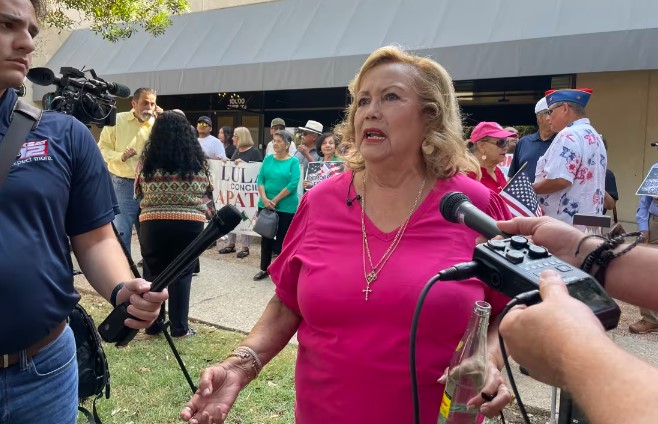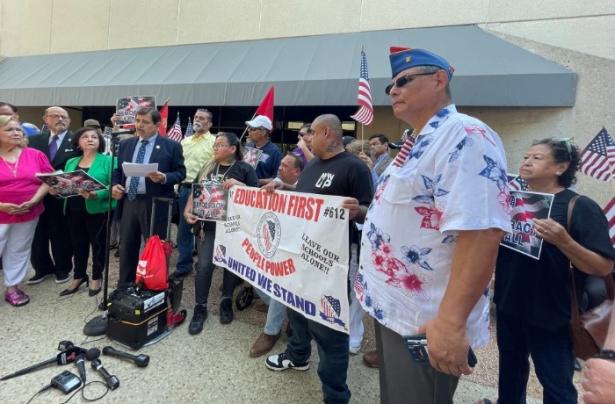Texas AG Raids Homes of Latino Civil Rights Group Members, Setting Up a Voting Rights Showdown
Raids on the homes of several Democrats in South Texas, in what the state attorney general said is an ongoing election integrity investigation, has set off a showdown with the nation’s oldest Latino civil rights group.
The Aug. 20 raids targeted Manuel Medina, chair of the Tejano Democrats, several members of the League of United Latin American Citizens, a state House candidate and a local area mayor.

The raids have triggered outrage and accusations of voter suppression in a state with a long history of discrimination against its citizens of Mexican descent, which gave rise to LULAC in 1929.
On Monday morning, LULAC leaders, state legislators, activists of other Latino groups and supporters and some of the people whose homes were raided protested outside the San Antonio office of Attorney General Ken Paxton, a Republican.
“This is point blank voter intimidation, and LULAC will fight for the right of every Latino to exercise the right to vote,” said Roman Palomares, LULAC's national president.
A copy of a wide-ranging search warrant left with one of the people targeted, LULAC volunteer Lidia Martinez, 87, of San Antonio, offered a window into the investigation’s interests. The warrant ordered the seizure of all electronic devices at her home, allowed for the opening of documents that were business-, organization- or election-related, and authorized swabbing for DNA. According to the warrant, the purpose of the search was to look for evidence of violations of the Texas election laws regarding vote harvesting and identity fraud.
Medina’s home was also “forcibly entered” in the early morning of Aug. 20. According to a filing from his attorney, officers woke up Medina, his wife and two young daughters, and “rummaged through the residence” for seven hours, the attorney said, searching through the living spaces, closets, kitchen, bathrooms, garage and the family’s bedrooms. Officers seized 65 cellphones and 41 computers and storage devices, the filing said.
Two Democratic consultants who weren’t knowledgeable about Medina’s business or the investigation said someone running an election phone banking or canvassing operation can have multiple phones and computers for volunteers and staff.
Medina's attorney was granted his request for an injunction to block the attorney general or any other state officials from reviewing the documents or disseminating them. A hearing on the search and seizures was set for Sept. 12.
In his filing requesting the injunction, Medina's attorney said authorities seized almost 65 cell phones and 41 computers, digital and other storage devices, papers, documents and family and other photographs.
The attorney and Medina declined comment when reached Friday by NBC News.
“There is no poll tax. There is no white-only primary. There is no going back. We will not go back,” Domingo Garcia, LULAC’s former president, said during Monday’s protest. Garcia now heads a recently formed LULAC political action committee that endorsed Kamala Harris.
Paxton, who announced the raids Thursday in a news release, has been outspoken in advancing baseless claims about voter fraud — particularly about noncitizens voting in the upcoming election.
“There’s a reason Joe Biden brought people here illegally,” Paxton said on a radio show earlier this month. “I’m convinced that that’s how they’re going to do it this time, they’re going to use the illegal vote. Why were they brought in, why did he bring in 14 million people? He brought them here to vote.”
Paxton falsely claimed that immigrants were being given Social Security numbers at the border as part of the scheme, too. There’s no evidence of that, or that noncitizens cast ballots in any significant numbers.
In the release announcing the raids, Paxton said his office would have no further comments on the investigation. NBC News reached out Friday and has not received a response.
But the release did state that the raids were the result of a two-year investigation based on allegations of voting and election violations from Audrey Gossett Louis, a district attorney for five area counties.
Latino leaders have called on the Department of Justice to investigate and are alleging the raids are a political move to suppress Latino votes. A Justice Department spokesperson said they are aware of the matter but declined to comment.
“It is disgraceful and outrageous that the state of Texas, and its highest-ranking law enforcement officer, is once again using the power of his office to instill fear in the hearts of community members who volunteer their time to promote civic engagement,” said Gabriel Rosales, Texas state director of LULAC, which focuses on Latino economic, political and civil rights.
“I have been contacted by elderly residents who are confused and frightened, wondering why they have been singled out. Attorney General Paxton’s actions clearly aim to suppress the Latino vote through intimidation and any means necessary to tilt the electoral process in favor of his political allies,” he added.
Cecilia Castellano, a candidate for state House District 80, said she was served a search warrant for her phone just after 6 a.m. on the same day as the others. Medina is working on Castellano's campaign.
“I was still asleep and I was woken up by my doorbell and then a hard knock,” she told NBC News later. “I went to the front and I have these flashlights flashing into my home.”
The officer shared a copy of the search warrant with Castellano and left with her work phone.
Castellano said she felt the search was political intimidation, adding that she’d been told two other people who had volunteered for her campaign were been served warrants. She said she’s never helped people to register to vote or vote by mail, and wasn’t sure for what she was being investigated.
Nine armed officers at the door
Up early as usual to water her plants, Martinez answered a knock at her door at 6 a.m. and in walked a group of armed men and women with police badges and riot shields and a search warrant, she told NBC News.
Still in her nightgown, Martinez asked to change clothes. Instead, she said she was forced to sit in her dining room answering questions while the agents rummaged for four hours through just about everything in her two-bedroom home. Two of the officers stood guard over her.
“They searched everything. My underwear, my brassieres, my nightgowns, everything,” said Martinez, a 35-year LULAC member. “They went into my garage. They opened up my car. They went through my whole car, my whole garage, my refrigerator, my kitchen cabinets, everything.”
At the news conference, Martinez said that for about half an hour she was made to stand outside her home, still in her nightgown, where neighbors could see, while the officers searched her dining area.
She said they would not tell her what they were looking for, and questioned her for four hours, asking her about Manuel Medina and when she joined LULAC.
They left with her appointment book, cellphone, laptop, blank voter registration cards and her certification for completing a voter registration course.
At the news conference, Martinez said nine people had shown up at her door to execute the search warrant. She said her family asked her to stop her volunteer work with LULAC, as well as any voter registration efforts, because they're afraid she'll go to jail.
"I grew up on the west side of San Antonio. My dad had two grocery stores and he taught us the right to vote," said Martinez, a San Antonio native. She added she had five brothers who served in the armed forces, including one who was killed in Vietnam and earned the Silver Star. Martinez is a commander with the American Legion.
"They're trying to stop us from registering voters, and helping, especially the seniors," she said.
"If I don't go out there, and their voter registration is expired, some of them are in wheelchairs. They don't have a way to be going to the elections office" to get registration forms, Martinez said.
Mary Ann Obregon, mayor of Dilley, about 71 miles south of San Antonio, said her dogs' barking alerted her to two officers who showed up at her home and demanded her phone when she went outside. She said on Monday she wasn't shown a search warrant until after they followed her in while she retrieved her phone.
After they left, "I got very emotional," she said. "I was crying."
[Suzanne Gamboa is a reporter for NBC Latino.
Jane C. Timm is a senior reporter for NBC News.]


Spread the word